What Does Call Raise Check And Fold Mean In Poker
- What Does Call Raise Check And Fold Mean In Poker Table
- What Does Call Raise Check And Fold Mean In Poker Room
Poker is played with various betting structures and rules for how much you can bet, raise or check-raise.
In some formats and games, for example, you can only bet a certain fixed amount for any bet and the amount of bets per round are capped; in other formats you can bet all your money in one go at any time.
If you've watched poker on TV you're likely most familiar with this form - aka 'No Limit' - which makes for spectacular 'all ins' and exciting showdowns.
This is a discussion on Raise or Fold theory within the online poker forums, in the Learning Poker section; I have met poker players who espouse the Raise of Fold Theory. They never call. The fourth and last possible raise in a fixed limit game. Cash Game Poker played for real money, with blind levels that stay the same. Players can come and go as they please, and buy new chips anytime they want. Calling Station A player who plays many hands in a very loose way. They will call often, but rarely raise or fold. Many players would also fold a weak ace, something like A-5 suited, to a check-raise like this. These hands likely comprise more than half of your opponent’s betting range, and therefore the. – 75% of the time he’ll fold and we’ll win 4,5 BB, a half of the capital we risk. Our re-raise has a positive EV based on this stat alone. – 25% he’ll call or 4-Bet. If he 4-Bets light, we’ll have the pot odds to call, although we’ll most probably be behind in the hand. Also, only act when it’s your turn – don’t check, call, or fold out of turn. This annoys other players. #2 – “I See You.And” You’ve probably seen poker in the movies where they all say “I see youand I’ll raise” – STOP! This is incorrect, and phrases like “I see you” are classed as a call, plain and simple.
The game usually being played on TV is No-Limit Texas Holdem so while these betting rules apply to many different forms of poker, consider these de facto Texas Holdem betting rules.
But No-Limit isn't the only way to make bets in poker. In fact for decades the most commonly played forms of poker were slow, steady 'Limit' betting rounds that kept variance and wild bankroll swings to a minimum. Pot-Limit formats (more on this below) are also quite common (eg Pot-Limit Omaha).
In this beginners guide to poker betting we'll take a look at the most common betting rules in Texas Hold'em and beyond. We'll start with the most popular one, of course - No Limit. It's easier to explain, even though it's not at all easy to master.
Beginners Guide to Poker Betting
No-Limit Poker
In No-Limit Poker, as soon as it's your turn to bet you're allowed to bet all the chips that you have in front of you into the pot. You don't even have to have the most chips at the the table -- you can go 'all in' with whatever you have in your stack.
As we mentioned it makes for great drama at the table and tense, cards exposed Texas Hold'em showdowns where one player is playing for their cash game or tournament life on the turn of a single card.
Don't get confused by the exaggerated scenarios of film or TV though - you still can't throw your car keys or your bearer bonds into the pot as they do it in the movies. You can't even dig into your wallet for more cash in the middle of a hand.
Today's No-Limit poker games always use a rule called 'table stakes.' It means that you can never bet anything above and beyond the money you had on the table when the hand started.
As the sharp observer will have noticed this means that there's a 'limit' to the betting after all. So 'no-limit' poker isn't actually without limits. But for the sake of simplicity, No Limit is the term used to describe it.
Don't make the mistake of thinking that no-limit poker is more dangerous for your bankroll than fixed-limit poker. It all depends on what stakes you play at. A game of Limit Texas Hold'em with blinds of $100/$200 certainly isn't cheaper than a No-Limit Texas Hold'em game with blinds of $1/$2.
What Does Call Raise Check And Fold Mean In Poker Table
Fixed-Limit Poker
In fixed-limit poker, the size of each bet is fixed in advance. In Hold'em and Omaha, the first two betting rounds use bets and raises the size of the big blind (called the small bet). In the following two betting rounds, bets and raises are twice the big blind (called the big bet).
When you specify the size of a fixed-limit game, the convention is to give the size of the small bet and the big bet. If the blinds are $1/$2, you'd say that the game is $2/$4. For the internet generation this may seem a bit odd, and it's different from no-limit and pot-limit poker. Still, it's common use.
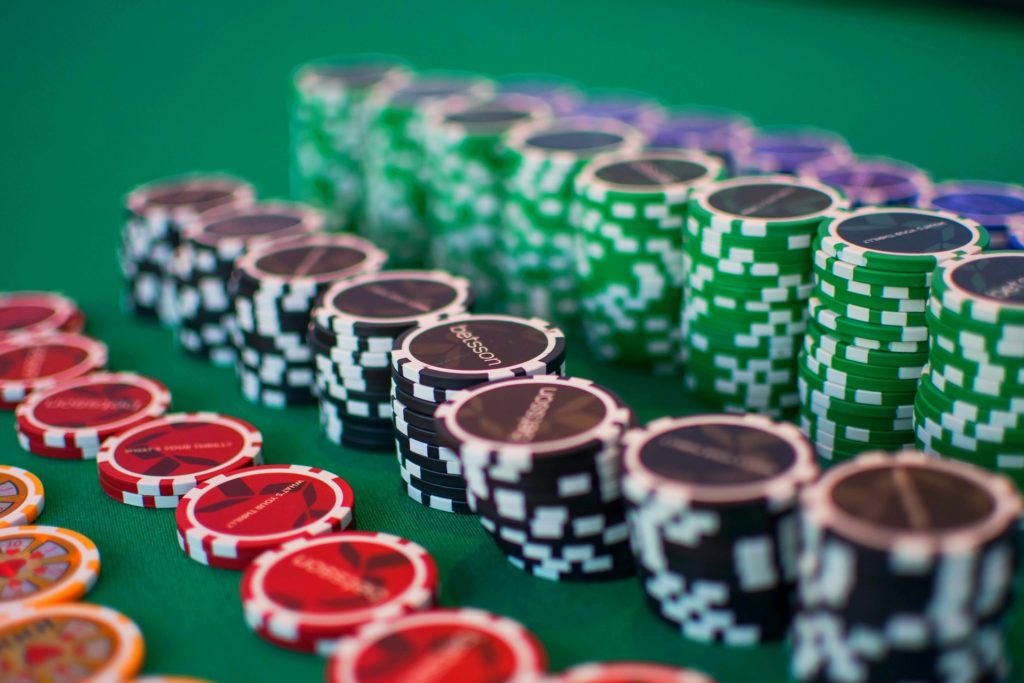
Often, the number of raises in each betting round is limited to three or four, after which the betting is 'capped.' This means that you won't be able to put in more than $6 or $8 during the first round of betting in a Texas Hold'em game with blinds at $1/$2.
This rule is often put out of play when only two players remain in the hand, in which case they can continue raising until all their money is in the pot. If they want to, that is.
Don't make the mistake of thinking that fixed-limit poker is easier than no-limit poker. Sure, you don't stand to lose your entire stack after a single mistake, but on the other hand you won't double your stack in one single move either. Fixed-limit is another game altogether and you have to play it differently.
Pot-Limit Poker
In Pot-Limit poker the amount you can bet when it's your turn is limited by the size of the pot. The pot-limit rule goes like this:
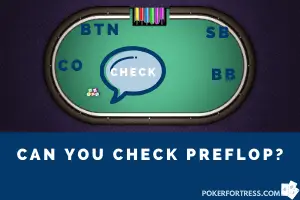
- You can raise up to the amount that is in the pot after you have called the previous bet.
This may sound a bit complicated and in practice it can get even trickier. Have courage though; there are some tricks you can use to master the pot bet. Read are in-depth guide to the pot bet here:
Don't make the mistake of thinking that pot-limit poker is safer for your bankroll than no-limit poker. Even if they are limited to the size of the pot, bets in pot-limit poker are generally not smaller than in no-limit.
Most bets in no-limit poker are actually the size of the pot or smaller.
How Betting Rounds Work in Poker
Each poker hand is made up of a number of betting rounds. The number of betting rounds depends on the poker variation.
In Texas Holdem there are four betting rounds. In Seven Card Stud there are five and in Five Card Draw there are just two betting rounds.
Fold, Call or Raise
In each betting round, the betting moves clockwise around the table. Each player in turn must either match the bet of the previous player (call) or get out of the hand (fold).
Or, instead of just calling, when it's your turn to bet you can also choose to bet more than the previous bet (raise).
When all players have either folded or called the last raise, the betting round is over. All bets that have been made during the betting round are added to the pot.
All players who remain in the hand have now put in the same amount. They have all matched the biggest bet in that betting round. You can think of this as a negotiation - players agreeing on the price to see another card.
When the betting round is over, if all players except one have folded, the remaining player wins the pot. If everybody else but you folds, you don't even have to show your cards to win. That's what makes bluffing possible in poker.
The Check
Before a bet has been made in the current betting round, the player whose turn it is can choose not to bet (check). Checking simply means passing on the turn to the next player without making a bet.
If it helps, you can think of checking as calling a zero bet. It it doesn't help you, please just forget about it.
The Check-Raise
Let's say that a player checks and another player puts in a bet. When the betting comes around to the player who checked may either fold, call the additional but - or raise!
If he raises here his move is called a 'check-raise.' This is not really a rule per se but it's still good to know what check-raising means.
Texas Hold'em Betting Order & The Blinds
At the start of each poker hand some players have to make a bet even before the cards are dealt.
This is to create a small pot to compete for. Without those 'forced bets' all players could fold every hand without any cost and poker would probably be a very slow game.
In some poker variations, the forced bets are called Blinds. The player to the left of the dealer puts in the small blind and the next player to the left puts in the big blind.
This is how it works in Texas Hold'em and Omaha. Blinds are 'live bets,' which means that they count as valid bets in the first betting round.
Once the cards have been dealt it is the player to the left of the big blind who starts the first betting round (this position is called 'under the gun'.)
He or she must either match the big blind, fold, or raise. Checking is not an option since the big blind is considered as a valid bet. Remember that you can only check if no player has bet before you in that betting round.
Important note: In subsequent Texas Hold'em betting rounds the player closest to the left of the dealer begins the betting round. SO that means while the small and big blind get to act last in the first round, if they are still in the hand they will act first after the flop is dealt.
The player with (or closest to) the dealer button will act last for the rest of the betting rounds. This is called 'having position' in Texas Hold'em and it is a very important concept for playing proper Texas Hold'em strategy.
Big Blind Has an Option
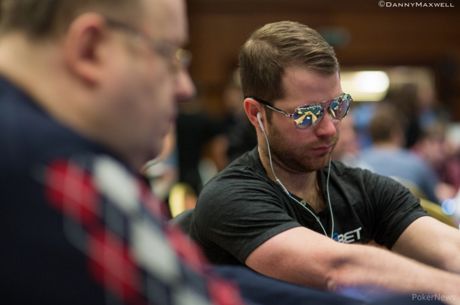
Normally in a betting round, when all players have either folded or called the current bet, the betting round is over. However, when you play with blinds there is an exception to this rule in the first betting round.
In the first betting round of Texas Holdem or Omaha, if all players fold or call the big blind the player in the big blind has an option: He or she may either check or bet.
Antes Instead of Blinds
Some poker variations use antes instead of blinds. An ante is a forced bet that all players have to put in the pot before the cards are dealt. As opposed to blinds, antes are not live bets. They are just put in the middle to stimulate the betting but do not count in betting for any one player.
When there are no blinds there must be some other rule to decide who begins the betting. In Seven Card Stud the player with the lowest card showing must start by putting in a half or a whole small bet (called bring in).
From there, the betting goes on a usual. Since there's no big blind there's also no big blind option in the first betting round.
The Showdown
When the last betting round is over, if two or more players remain in the hand there is a showdown. Players show down their cards and the best hand wins the pot. If two hands are equally good, the pot is split equally between them.
Who Shows Cards First in Poker Showdown?
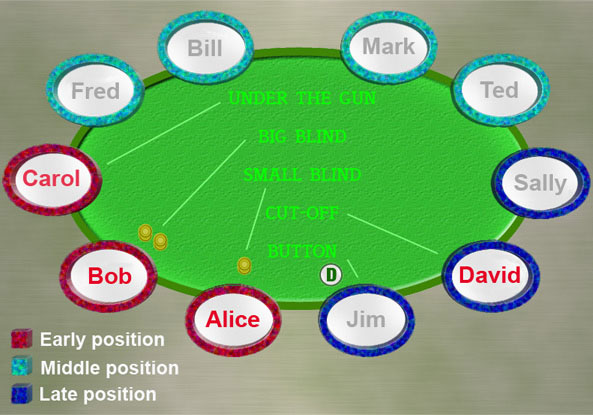
- If the pot was raised, it's the player who put in the last raise
- If there was a bet but the pot wasn't raised, it's the player who put in the first bet
- If there was no betting, it's the first remaining player to the left of the dealer
The player who shows first has to show down his or her cards. Then the other remaining players show their cards in clockwise order. If their hands are losing hands, they don't have to show their cards - they can just slide their hands to the dealer without revealing what they hold.
You can, however, always show your cards if you feel like it.
Read More:
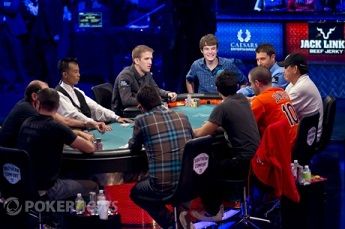
More Poker Games Rules
Poker Tools:
Check, Bet, Call, Fold, or Raise?
One of the most important decisions you make when playing Multiplayer Draw Poker at The Gold Casino is what to do when your turn comes around. Should you open? Or should you just check? If someone has already bet, should you call? Should you fold? Or should you raise?
If you are dealt no pair or a very small pair to begin with, of course you should check. There’s no sense opening on the hope that you’ll draw to three of a kind, especially since other players will be drawing for higher three of a kinds. If somebody opens in this situation, you should certainly fold. But if everybody checks, go ahead and draw for three of a kind. If you get it, you should certainly open. Chances are you’ve got a winner, and you’ll have a very good idea if your beat depending on if somebody raises and for how much.
Let’s say that you are dealt a pair of jacks or higher. In this case, you should go ahead and open for at least 30 or 40 grams. Why not 20 grams? Because everybody will call you, and one of the objectives of opening is to get some players to fold in order to eliminate some of the competition. Many players will call you no matter what they have in their hand, because they just want to play. But good players won’t call you unless they have at least a somewhat decent pair, a pair of nines or higher.
So now you’ve opened with 30 or 40 grams, and nobody has bet into you. Should you open again? I say “yes,” even if your hand hasn-t improved – that is, even if you didn’t get another jack or a second pair. The real decision comes if you get raised. If you do get raised, chances are you’re beat, so fold your hand when your turn comes around. But if you did get a second jack or another pair and got raised, then you need to take more facts into consideration. How many cards did the raiser discard? If two or three, the player might have had three of a kind to begin with, or might have made three of a kind or two pair. If the raise is not too big and you can afford it, go ahead and call; even if you lose, you’re keeping the other player honest, and gathering important information about how that player plays the game.
Here’s another scenario. Suppose that after the draw you’ve been dealt three of a kind, lets say three nines. If nobody before you has bet, of course you should open. Keep in mind here that you have a very strong hand, so you want to collect some gold for it. The amount you should open with depends on how much the players have been betting in the game. Have the players been opening after the draw for only 30-40 grams? Or have they been opening for 100-200 grams? As a rule of thumb, you want to follow suit. For if the players have been opening with only 30-40 grams and you open with 200 grams, they’re all going to fold and you’re not going to profit with your good hand. But if they’ve been opening with 100-200 grams, go ahead and do the same – since it will look like you’re doing nothing out of the ordinary, people will call and if you’ve got a winner you’re going to collect some gold. Now, chances are against another player beating your three nines, but you can’t let that deter you. Losing with good hands is just part of the game.
What Does Call Raise Check And Fold Mean In Poker Room
But what do you do if you get raised with your three nines? I can’t give you a black and white answer to this question: what you should do depends on how many cards the other player discarded (do you think he or she made a straight or a flush); how careful or reckless the other player has been playing; how much you can afford to lose; if the player has been constantly bluffing, etc. The only way to make these judgment calls is PRACTICE! Keep playing Multiplayer Draw Poker at The Gold Casino, and you’ll catch on in no time.